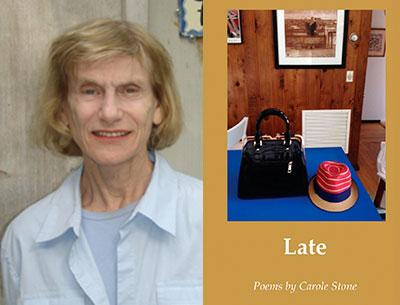An Honest Accounting

“Late”
Carole Stone
Turning Point, $17
It’s never too late to take inventory of your life, because the end always comes too soon. For Carole Stone, the time is now. “Late” is the poet’s most recent collection and catalogs the moments following a diagnosis of cancer. The book is divided into four sections: “After,” “Beginnings,” “Late,” and “Out East.” And more than just a prelude to the end, the poems are a decisive journal of rebirth.
“Late” reads like a memoir. There is a clear narrative force behind the poetic language that elevates it to a survivor story without drama. Ms. Stone depicts her world as it is, with tender recognition of the ephemeral nature of things and unsentimental praise for its essential being. It’s not so much an ode to life, but an honest account of details and circumstances through the poet’s eyes:
Seaweed drying,
shells without clams,
like my uterus touched by death.
Along the path, like a nomad
who awakens to an oasis,
I find a beach plum.
Purple juice squeezed out,
its bitter flesh touches
my lips, my tongue.
In the shadow of all
that is hard to bear,
this next dark phase of my life,
isn’t being born enough?
I’m glad to be moving,
even sideways like a crab
crawling back into the water
on my way
to where words drop off.
The poem “Dread” may be fixed on fear, yet something greater happens. The poet is “glad to be moving” and escapes the trap of suffering on her way “to where words drop off.” The initial response to painful news may be to deny the full reality of it. Ms. Stone writes about an experience with cancer in a way that delves into the process of treatment and recovery without succumbing to cliché. In “After,” the book’s opening section, the poet faces adversity her own way and offers a refreshing look at life going on despite the diagnosis.
In many ways, “Late” symbolizes the chance we have to take stock of our existence at any time. The next section, aptly called “Beginnings,” features poetry of remembrance. When faced with death, what essentially matters?
Summer surrounds me,
gust of wind,
a Long Island beach,
salt smell of time past,
at the Jersey shore in August,
aunts and uncles in a circle
on striped beach chairs, gossiping.
No talk of my mother and father
in their graves.
Washed up broken shells shine
like the small diamond chips
of my mother’s wedding band.
I’ve worn it and worn it
for so many years,
like bits and pieces
of her short life.
Her ring has not worn down,
fits my finger perfectly,
like the beach shells
which were once whole.
The sun radiates
from the tiny yellow shells.
Goodbye I cry
from my end-of-summer heart.
The poem “Shells” captures the particulars of a summertime experience. Images of broken shells evoke a mother’s absence, which portends the inevitable disappearance of the poet, too. It’s after looking back that we are able to see ahead more clearly, and Ms. Stone balances this paradox like a tightrope-walker, with a casual expression on her face. Her poetry is from the heart sophisticated; like a mother’s love it contains multitudes and provides for the unexpected.
In the third section of the book, the poet is more extroverted and imagines life and death simultaneously in the world. There’s a liberation from duality and a return to normality with new awareness. She contemplates losing a partner while waiting for a bus, the fallacy of perfection while cutting an apple, her granddaughter’s piano playing, what her last request on earth would be, the beauty of Verona Park at dusk, and reading “Finnegans Wake” with a book group. The poetry is full of appreciation for what remains.
The final section, “Out East,” portrays the simple and enchanted life we live on the East End. It’s easy to write too much about idyllic places and kill your subject. Better to be brief and let those things of beauty speak for themselves, to participate in the aesthetic of near silence.
I can only tell in images
what painters copy —
the heron taking flight,
the nesting cormorants,
the Queen Anne’s lace,
leaning into the wind.
In poems like “Plein Air,” Ms. Stone is at her best. Poets give everything to write such economical lines. They say it all. Yet I have to quote one more passage from a poem titled “Bric-a-Brac” because of its humor and Byronic charm.
Death’s been charmed away
by chemo and chance.
An AARP article says to spell out
last wishes in advance.
Lucas Hunt is the author of three books of poetry, “Lives,” “Light on the Concrete,” and the forthcoming “The Muse Demanded Lyrics.” Formerly of Springs, he is the director of Orchard Literary and the founder of Hunt & Light, a publisher of poetry.
Carole Stone’s previous collection of poems was “Hurt, the Shadow.” A professor emerita of English at Montclair State University, she lives part time in Springs.
